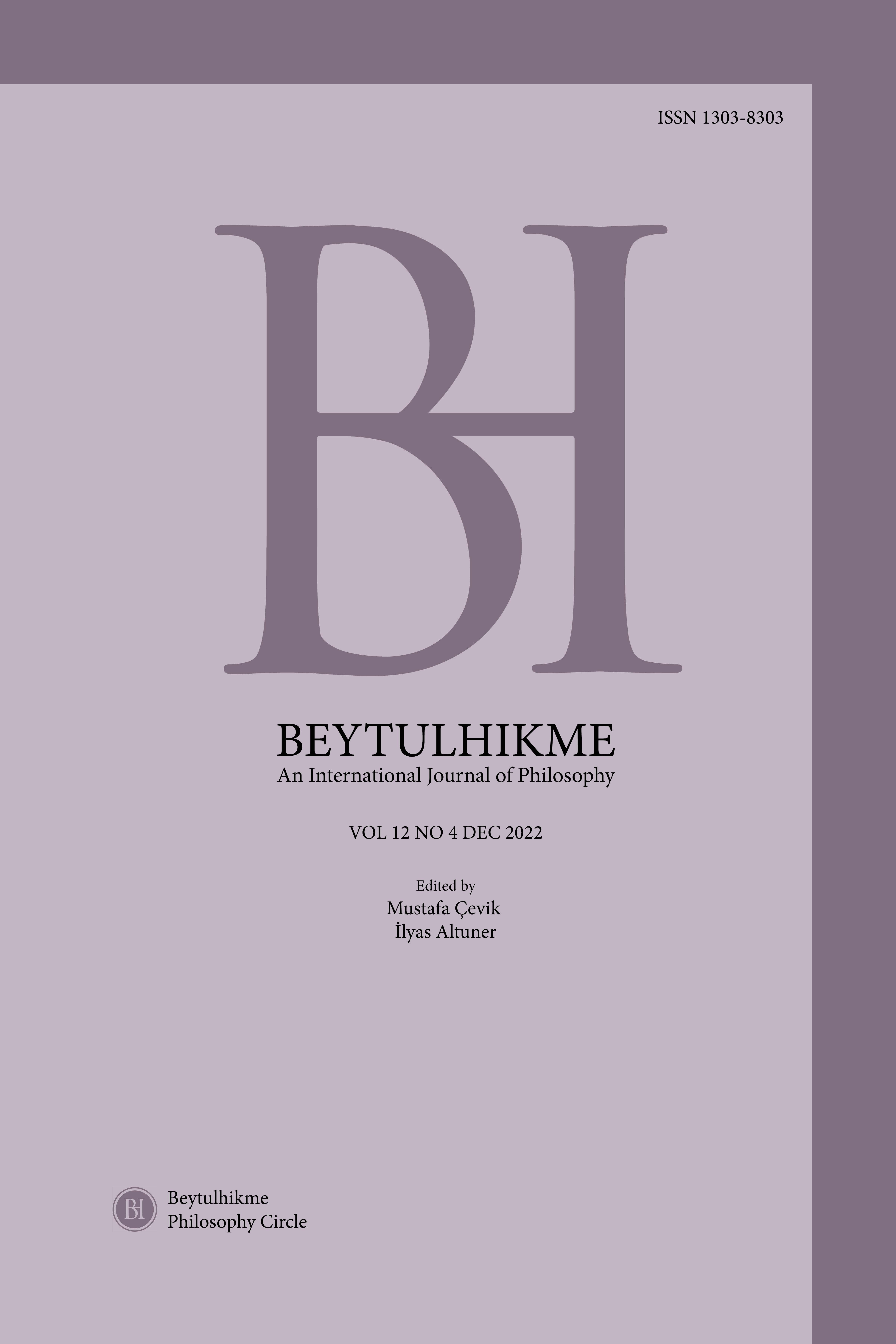Author :
Abstract
Anti-felsefe, kökeni Antik Yunan’a dek uzanan ancak teknik bir terim olarak 18. yüzyıl sonlarında dolaşıma giren ve 20. yüzyıl Kıta Avrupası Felsefesi’nde oldukça güçlenen bir eğilimdir. Dil felsefesindeki gelişmelerle birlikte yapısalcılık/postyapısalcılık, yapısöküm, postmodernizm gibi hareketler anti-felsefenin önem kazanmasında etkili olmuştur. Bu yönelimler felsefenin alanını sınırlayarak ya da sonunu ilan ederek anti-felsefe geleneğini canlı tutmaktadır. Badiou düşünce tarihinde en büyük “olay’lardan biri olarak gördüğü Nietzsche’nin aynı zamanda modern anti-felsefe inşasında kurucu bir rol üstlendiğini beyan eder ve onu anti-felsefenin tartışmasız kralı ilan eder. Badiou’nun bir yandan tüm anti-felsefe eğilimlerine reddiyeler sunması, bir yandan da Nietzsche’yi kendi düşüncesinin ana akımı dışında tutarak bir “olay” kabul etmesi kritik ve tartışılması zorunlu bir felsefi gündem oluşturmaktadır. Bu çalışmayla felsefenin kapanışı iddialarını temellendiren Nietzsche söyleminin anti-felsefi karakterini kavramayı ve Badiou’nun onu bir düşünce olayı kabul etmesini Olay Felsefesi alternatifi çerçevesinde irdelemeyi amaçlamaktayız. Çalışma Nietzsche’den Lacan’a geniş bir düşünce skalasına sahip anti-felsefe hareketinin altyapısını değerlendirmek için bir ilk adım teşebbüsü olarak da değerlendirilebilir.
Keywords
Abstract
Anti-philosophy is a tendency that dates back to Ancient Greece but came into circulation in the late 18th century as a technical term and gained strength in 20th-century Continental Philosophy. Movements such as structuralism/poststructuralism, deconstruction, and postmodernism have been influential in becoming important for anti-philosophy along with the developments in the philosophy of language. These tendencies nourish the anti-philosophy tradition by limiting the field of philosophy or declaring its end. Badiou declares that Nietzsche, whom he considers one of the most significant “events” in the history of thought, also plays a founder role in the construction of modern anti-philosophy and announces him the undisputed king of anti-philosophy. Badiou's denial of all anti-philosophical tendencies on the one hand, and his acceptance of an "event" by excluding Nietzsche from the mainstream of his thought on the other, becomes a critical and necessary philosophical agenda. With this study, we aim to comprehend the anti-philosophical character of Nietzsche's expression, which founds the claims of the closure of philosophy, and to examine Badiou's acceptance of it as an event of thought within the framework of the alternative for Philosophy of Event. The study can also be considered a first step attempt to assess the infrastructure of the anti-philosophy movement, which has a wide range of thoughts from Nietzsche to Lacan.
Keywords
- Badiou, A. (2001). Who is Nietzsche? Pli The Warwick Journal of Philosophy, 11, 1- 11.
- Badiou, A. (2005). Being and Event.
- Badiou, A. (2012). Felsefe İçin Manifesto (M. Erşen, Çev.). Monokl.
- Badiou, A. (2015). Fransız Felsefesinin Macerası (P. B. Yalım, Çev.). Metis.
- Badiou, A. (2016). Nietzsche Anti-Felsefe Seminerleri (İ. Birkan, Çev.). Sel.
- Badiou, A. (2017). Platon, Sevgili Platon’umuz. İçinde S. E. Er & B. Akar (Ed.), Yaşayan Platon. Çizgi.
- Badiou, A. (2021). Lacan Anti-Felsefe Seminerleri, (N. K. Sevin, Çev.). Sel.
- Bosteels, B. (2008). Radical Antiphilosophy. Filozofski vestnik, XXIX(2), 155-187.
- Bull, M. (2013). Anti-Nietzsche (M. B. Tokdemir, Çev.). Doruk.
- Caputo, J. D. (2022). Hakikat- Postmodern Çağda Bilgelik Arayışı (R. Yılmaz, Çev.). Kapı.
- Deleuze, G. (2016). Nietzsche (İ. Karadağ, Çev.). Otonom.
- Demirtaş, M. (2018). Özgürleşme Siyasetinde Fark ve Olay. Otonom.
- Hewlett, N. (2018). Badiou, Balibar, Ranciére (H. İ. Mavituna, Çev.). Metropolis.
- Nietzsche, F. (2007). İşte Böyle Dedi Zerdüşt (A. Cemal, Çev.). Kabalcı.
- Nietzsche, F. (2008). Deccal Hıristiyanlığa Lanet (A. Kaya, Çev.). Say.
- Nietzsche, F. (2010). Putların Alacakaranlığı (Tüzel, Çev.). İş Bankası.
- Nietzsche, F. (2011). Ecce Homo- Kişi Nasıl Kendisi Olur (C. Alkor, Çev.). İş Bankası.
- Nietzsche, F. (2019). Eğitimci Olarak Schopenhauer (C. Atila, Çev.). Say.
- Solomon, R. C. (2020). Akılcılıktan Varoluşçuluğa Varoluşçular ve 19. Yüzyıldaki Kö- kenleri (R. Kuldaşlı, Çev.). İş Bankası. Öz: Anti-felsefe, kökeni Antik Yunan’a dek uzanan ancak teknik bir terim olarak 18.yüzyıl sonlarında dolaşıma giren ve 20.yüzyıl Kıta Avrupası Felsefesi’nde oldukça güçlenen bir eğilimdir. Dil felsefesindeki gelişmelerle birlikte yapısalcılık/postyapısalcılık, yapısöküm, postmodernizm gibi hareketler anti-felsefenin önem kazanmasında etkili olmuştur. Bu yönelimler felsefenin alanını sınırlayarak ya da sonunu ilan ederek anti-felsefe geleneğini canlı tutmaktadır. Badiou düşünce tarihinde en büyük “olay’lardan biri olarak gördüğü Nietzsche’nin aynı zamanda modern anti-felsefe inşasında kurucu bir rol üstlendiğini beyan eder ve onu anti-felsefenin tartışmasız kralı ilan eder. Badiou’nun bir yandan tüm antifelsefe eğilimlerine reddiyeler sunması, bir yandan da Nietzsche’yi kendi düşüncesinin ana akımı dışında tutarak bir “olay” kabul etmesi kritik ve tartışılması zorunlu bir felsefi gündem oluşturmaktadır. Bu çalışmayla felsefenin kapanışı iddialarını temellendiren Nietzsche söyleminin anti-felsefi karakterini kavramayı ve Badiou’nun onu bir düşünce olayı kabul etmesini Olay Felsefesi alternatifi çerçevesinde irdelemeyi amaçlamaktayız. Çalışma Nietzsche’den Lacan’a geniş bir düşünce skalasına sahip anti-felsefe hareketinin altyapısını değerlendirmek için bir ilk adım teşebbüsü olarak da değerlendirilebilir. Anahtar Kelimeler: Anti-philosophy, philosophy of event, tendency, Badiou, Nietzsche.





